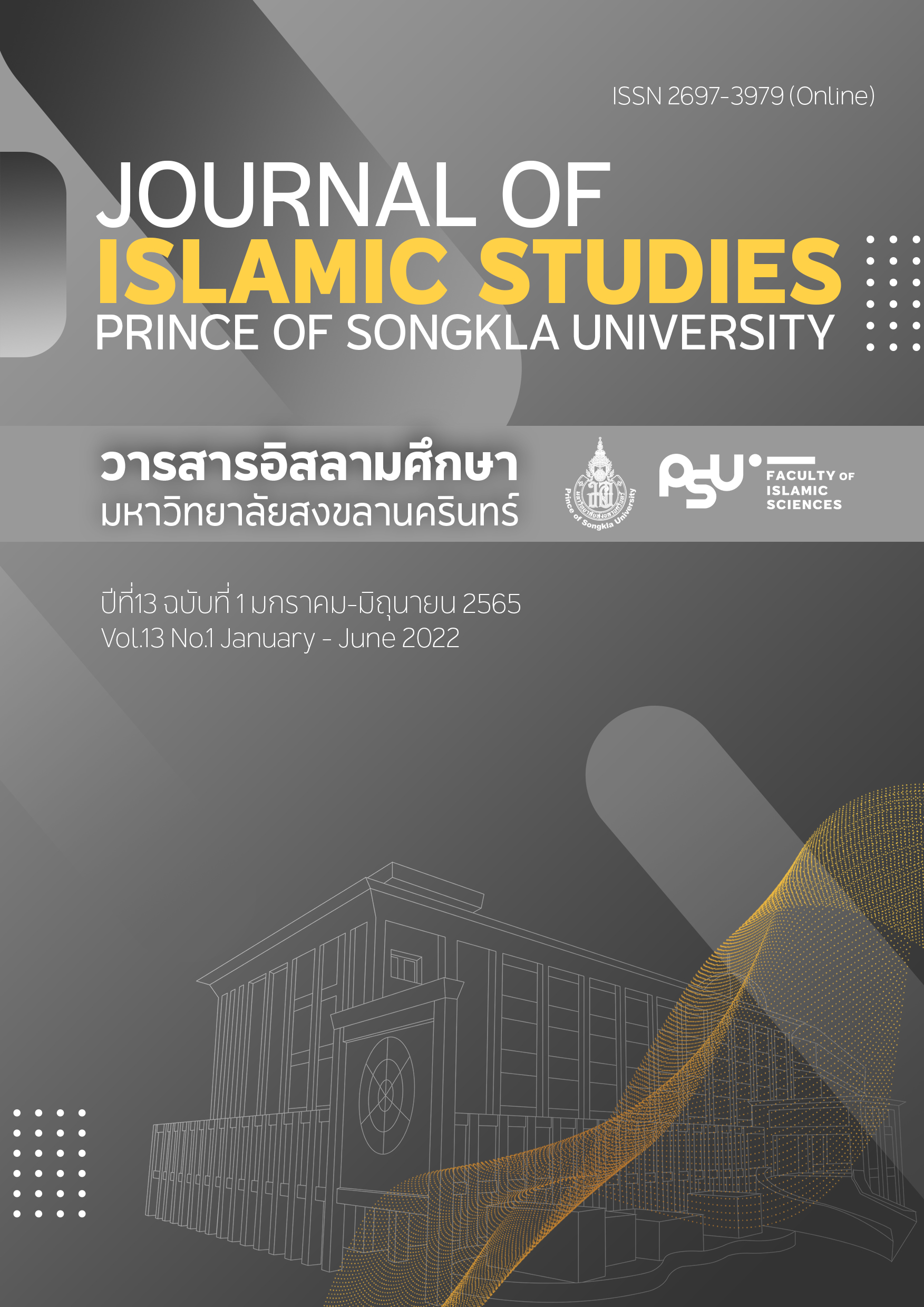The needs and expectations of students towards the graduate program of Islamic studies.Faculty of Islamic Science Prince of Songkla University Pattani Campus
Keywords:
Needs and Expectations, Students, Graduate Islamic Studies ProgramAbstract
Objectives This research was to study the needs and expectations of students towards Islamic studies at the graduate level. Faculty of Islamic Science Prince of Songkla University Pattani Campus
Methodology Quantitative data was collected from 51 master's degree and doctoral students of the Faculty of Islamic Studies. Data were analyzed by using descriptive statistics such as frequency distribution, mean, and standard deviation.
Research findings The results showed that Prince of Songkla University student Pattani Campus respondents the opinions on the needs and expectations of Islamic studies programs at the graduate level were at a high level. with a mean of 3.97 and a standard deviation of 1.053. When considering each aspect, it was found that the aspect with the highest opinion was Student Development The mean was 4.01 and the standard deviation was 1.14, followed by educational support factors. The mean was 4.00 and the standard deviation was 0.957, followed by Teaching The mean was 3.99 and the standard deviation was 1.063, and the aspect with the least opinion was Service The mean was 3.87 and the standard deviation was 1.050, respectively.
Application the organization and personnel involved in administering the Islamic Studies Program at the graduate level, Doctor of Philosophy in Islamic Studies Program Faculty of Islamic Science Prince of Songkla University Pattani Campus able to use research results to improve and develop the curriculum to be more ready and complete including the organization or other universities can apply the results of the study to improve their own curriculum.
References
Office of the National Economic and Social Development Board (2015) Direction of the National Economic and Social Development Plan No. 12
Faculty of Islamic Studies (2018), Doctor of Philosophy Program Islamic Studies Program Improved Program 2018, Faculty of Islamic Studies, Prince of Songkhla University, Pattani Campus
Wattanapakorn, P. (2014). The Study of Achievement of Student Centered Learning Model in Seminar in Multimedia in Mass Communication of the 4th year students of Multimedia Technology Department, Faculty of Engineering and Architecture :Rajamangala University of Technology Issan. RMUTI JOURNAL Humanities and Social Sciences, 1(1), 66–72. Retrieved from https://so05.tci-thaijo.org/index.php/RMUTI_SS/article/view/19 623
Phonprathan, S., & Kittithamopas, S. (2010). Learning Achievement in Photography for Communication Subject. Using images for communication using project-based teaching and learning on a network. Faculty of Engineering and Architecture, Rajamangala University of Technology Isan Surangkarat Nuengchaiyot (2006)
Baosuwan, K. (2007). Satisfaction towards studying at Suan Dusit Rajabhat University. Sukhothai Provincial Center. Faculty of Humanities and social sciences, Suan Dusit Rajabhat University.
Na Ayudhya, W. T. (2001). Development of teaching and learning in higher education. Printing house of Chulalongkorn University.
Pooboomin, P. (2015). Factors Affecting Students’ Satisfaction on service’s the Office of Academic Promotion and Registration Rajabhat Mahasarakham University. Master of Public Administration Thesis Mahasarakham University.
Thammacharoen, R. (2011). Factors and Indicators Affecting Popularity of Private Islamic Schools in the Special Development Zone of Southern Border Provinces. Journal of Education Burapha University. 22(3), 73-85.
Katih, I. (2019). The role of the College of Islamic Studies, Prince of Songkla University Pattani Campus on Understanding Islamic Moderation and Adaptation in a multicultural society. Journal of Islamic Studies, Prince of Songkla University, 10(2), 1–13. Retrieved from https://so03.tci-thaijo.org/index.php/JOIS/ article/view/233519
Maslow, A. (1970). Human needs theory: Maslow’s hierarchy of human needs. In R.F. Craven & C. J. Hirnle (Eds.), Fundamental of Nursing: Human Health and Function. (3rd ed.). Lippincott.
Maslow, A. (1970). Motivation and Personality (2nd ed.). Harpers and Row.
Maslow, A. H. (2000). The Maslow Nusiness Rreader. John Wiley & Sons.
Chonko, Lawrence B., John F. Tanner, and William A. Weeks. (1992), Reward Preferences of Salespeople. Journal of Personal Selling and Sales Management, 12(3) (Summer), 67-75.
Downloads
Published
How to Cite
Issue
Section
License
Copyright (c) 2022 Journal of Islamic Studies, Prince of Songkla University

This work is licensed under a Creative Commons Attribution 4.0 International License.
All articles Published in The Journal of Islamic Studies are author’s opinions, and not the responsibility of the Faculty of Islamic Sciences nor the editorial board. However any citation should be referred to the journal.
















